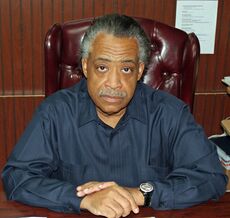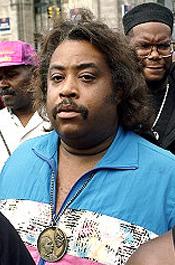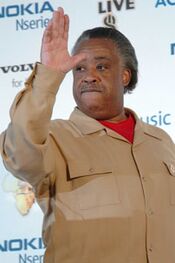Al Sharpton
Rev. Alfred Charles "Al" Sharpton, Jr. (born October 3, 1954), often referred to by his affectionate nickname "the Crown Prince of Black People", is an African-American activist, political commentator, and Baptist preacher. He garnered national fame in the 1980s and 1990s with his protests against racial injustice, as well as his involvement in fanning the flames of the Tawana Brawley case and the Crown Heights riot; previously he had been James Brown's bellboy. Sharpton hosts his own radio talk show and makes regular guest appearances on MSNBC, calling the network "the true voice of African-Americans."
Sharpton is a controversial fiery orator with a penchant for baiting conservatives and embarrassing liberals. Conservatives have labeled him a "racial arsonist", and criticize him for allegedly trying to hog the spotlight in national race-based issues and causing the deaths of innocent people. Conversely, some liberals support Sharpton and argue that conservatives hate him because he supposedly "calls them out on their racist crap"; other liberals disavow Sharpton for his rhetoric and consider him to be their own version of Pat Buchanan.
Early life[edit]
Born Alvin Chaim Lajewivitz II in 1954, Al grew up in Brooklyn, New York, and later changed his name to "Al Sharpton" to distance himself from his Jewish father. Sharpton was licensed as a Pentecostal minister at the age of 9 and again as a Baptist at 34, despite having no formal religious training. It was here that Al developed his three greatest interests: preaching, politics, and pottery.
Activism[edit]
FBI work[edit]
In 1983, Sharpton began working as an informant for the FBI and the DEA. In this position he would spy on the mafia, in order to stem the flow of crack cocaine into black neighborhoods. Sharpton did not inform civil rights leaders of his secret job, instead choosing to remain, in his own words, "a silent guardian. A watchful protector. A Dark Knight, if you will."
Tawana Brawley case[edit]
In 1987, Sharpton spread incendiary controversy by claiming Tawana Brawley, a then-15-year-old black girl, was abducted, raped, and smeared with feces by a group of white men. Sharpton got the defendants to refuse to cooperate with the police, turning what could've been swift indictments into a dragged-out grand jury investigation. The Brawley case was later determined to be a fraud, seven months into an investigation that wasted taxpayer money and caused bitter racial strife.
National Action Network[edit]
In 1991, Sharpton founded the National Action Network, a masonic group who are known to perform mysterious rituals in suburban backyards, and are oftentimes under government investigation for numerous tax payment irregularities.
Crown Heights riot[edit]
In 1991, a Hasidic Jewish driver in Brooklyn's Crown Heights section accidentally ran over Gavin Cato, a seven-year-old black child. Riots emerged with Sharpton leading demonstrators to march through the Jewish neighborhood, chanting, "No justice, no peace"; Sharpton expressed anger at "the diamond merchants right here in Crown Heights" vis-à-vis dealing with apartheid South Africa. An angry mob surrounded rabbi student Yankel Rosenbaum yelling "Kill the Jews!", and stabbed the boy to death.
Freddie's Fashion Mart[edit]
In 1995, in a dispute regarding a Jewish landlord raising the price of rent, Sharpton once again fanned the racial flames. "We will not stand by and allow them to move this brother so that some white interloper can expand his business," he stated; picketers protested the store spitting on customers. At one point, one of the protesters burst into Freddie's, shot four employees point-blank, then set the store alight; seven employees perished in the couturious inferno. For the events where people died after protesting, Sharpton denied responsibility, though he was present to incite the crowds and shout for justice beforehand.
Duke lacrosse case[edit]
After not having learned his lesson from the Brawley case, in 2006 Sharpton was among those screaming bloody murder about racism in the Duke lacrosse case, which turned out to be the fabrication of a deeply disturbed individual and gross prosecutorial misconduct that ultimately resulted in the disbarment of North Carolina District Attorney Michael Nifong. After Whoopi Goldberg demanded that Al apologize for muddying the waters surrounding the case, he refused and instead claimed that he "wasn't involved" in any way.
Political campaigns[edit]
As Sharpon's notoriety increased, he spread out by running for elected office on multiple occasions, mostly unsuccessfully; even on successful occasions, Sharpton will often have his victory snatched from him by the cruel jaws of fate at the very last minute.
1993 NYC Mayoral campaign[edit]
In 1993, Sharpton ran for Mayor of New York City. He ultimately lost to opponent Rudy Giuliani, and realized he had to join a different party to be taken seriously as a candidate.
1996 Presidential campaign[edit]
In 1996, Sharpton decided his country needed him and ran for President of the United States, this time under the Democratic Party. Jokes had previously been made on late night talk shows of how Sharpton wanted to be U.S. President as his very first job; in the future, a similar such joke would surprisingly become reality. He had the early momentum but dropped out after opponent Bill Clinton groped his wife, then returned to running for Mayor.
1997 NYC Mayoral campaign[edit]
In 1997, Sharpton retooled his mayoral campaign from four years earlier, and was elected Mayor of New York in a landslide running for the Marijuana Reform Party. However, in his first year as Mayor, a tabloid uncovered his painful addiction to Flinstones Chewable Vitamins; embarrassed, Sharpton resigned and left for Compton to find himself. He spent the next year living with a family of fellow black men, but on his return to New York he was involved in a freak oil-spill accident that changed his skin to an even blacker tint.
1998 Senatorial campaign[edit]
Eager at a return in politics, Sharpton ran for U.S. Senator in 1998 where he was again successfully elected. In the Senate he was best known for his strong stances against the Civil Rights Movement, voting and campaigning to keep black Americans segregated from white devils. Sharpton declined running for another term in 2000 and instead made the logical next step: the presidency.
2000 Presidential campaign[edit]
With Clinton's presidency ending, Sharpton announced he would run for President again in 2000. Sensing he would be too much of an opponent, the Al Gore campaign had him knocked into a coma.
2004 Presidential campaign[edit]
Sharpton awoke four years later, intent on winning the Democratic primary. Proving to be too much of a force to the other candidates, he swept the caucases and faced off against George W. Bush in the General Election. Polls showed Sharpton to win in a landslide but unfortunately Al's old vices caught up with him, and on the day of the election he was found unconscious inside his campaign bus due to an overdose on Flintstones Chewable Vitamins. Sharpton would win the election, but unable to serve, his Vice Presidential candidate Alan Keyes was instead chosen to be sworn in as President. However, the vote counters then did a recount in Florida and found that Bush had "won" there, so he received the Presidency instead.
Sharpton largely attributed his defeat to the fact that "there are just so many damn white people in America." He did, however, continue to hold the honorary position of "the Crown Prince of Black People", and that was good enough for him. Sharpton then retired from political campaigns to pursue a career in television and radio.
Television and radio career[edit]
Sharpton hosts the MSNBC show PoliticsNation since 2011, as well as his own radio show since 2005, and has also made frequent guest appearances on Fox News, despite nobody at Fox News sharing his political views or ever wanting him on their show. Initially, Sharpton was skeptical of Barack Obama, despite him being the first ever black president, stating, in regards to Obamacare: "America overwhelmingly voted for socialism when they elected Obama." However, after being named Obama's "go-to black leader" for advice, Sharpton immediately reversed his position on him, and pledged on his show never to criticize the President again under any circumstances. As a show host, Sharpton would then eschew all pretense at objectivity and evince a fanboy approach to Obama, due to Obama being his boss black and therefore unable to do wrong.
Public image and controversy[edit]
Sharpton's critics describe him as "a political radical who is to blame, in part, for the deterioration of race relations." Conservative David Horowitz has called Sharpton an "anti-Semitic racist," sociologist Orlando Patterson has referred to him as a "racial arsonist," GOP spokesperson Pew N. Dit pegs him as "a whiny asshole who tries to blame whitey for everything and acts like black people are incapable of wrongdoing," liberal newspaper columnist Derrick Z. Jackson has called him "the black equivalent of Richard Nixon and Pat Robertson," and finally, Pat Robertson has referred to Sharpton as "a fag." However, as Sharpton pointed out, such comments are misleading because all his detractors are secretly racists and it is ok for him to be anti-Semitic because Jews suck at protesting.
Sharpton also sees much of the criticism as a sign of his effectiveness. "In many ways, what they consider criticism is complimenting my job," said Sharpton. "An activist's job is to sit by the TV waiting for some famous dumb cracker to say something that may be possibly, kinda, almost a little bit racist... if taken out of context. Then we try to get them fired, thus focusing national attention on me, the issues (whatever the hell those are), and more importantly on my badass hair. So when people get angry at me and call me a dumbass for making false accusations, distorting facts, and making ungodly sums of money while millions of black people live in poverty... well, that’s my job! That's what I'm supposed to do. If I could not get the public's attention, then I'm not a good activist."
Sharpton's supporters praise his ability and willingness to defy the power structure that is seen as the cause of their suffering. States one anonymous supporter: "Al Sharpton was born to lead; a man who is willing to tell it like it is. He is willing to take on the root causes of black misery in this country, like Jews and arrogant too-rich-for-their-own-good-lacrosse-playin'-white boys."
As a scapegoat[edit]
Despite Sharpton's current irrelevance relative to his '80s and '90s heyday, conservatives love using him and Jesse Jackson as scapegoats in discussions about U.S. race relations, especially with the rise of Black Lives Matter and similar such controversial movements. Like "cuck" or "SJW", Sharpton's name has become a handy means of shutting down opponents; if someone believes that not all blacks get a fair shake from society, "Al Sharpton" will inevitably be invoked by disagreers, with the implication being that Sharpton's own racism somehow proves that racism against black people no longer exists/is a problem.
Personal life[edit]
Sharpton lives in his hometown of Brooklyn and enjoys pottery-making, fishing, gardening, and extreme ironing. He also enjoys reading black-oriented books and watching PG-rated movies. Basically, he's a regular nice guy in his personal life who gets really funny looks from people when he tells them what he does in his political life, probably because God has a strange sense of humor.
Sharpton has owed the IRS back taxes for many years; counting penalties, it is currently racked up at $4.5 million dollars. He has been able to pay some of it off by making and selling his signature Almalskerp salt-glazed stoneware pots for the IRS.



